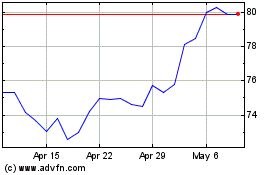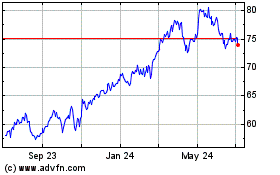By Leslie Scism and Joann S. Lublin
American International Group Inc. said Chief Executive Peter
Hancock will resign, a move that follows the giant insurance
conglomerate's recent failure to meet a series of financial
targets.
Mr. Hancock tendered his resignation during a board meeting at
the company's headquarters on Wednesday, according to people
familiar with the matter. The board could have appointed someone as
interim leader but instead asked Mr. Hancock to stay on during the
search for his successor.
AIG's board hasn't yet decided whether to use a search firm to
find its next CEO, the people familiar said. The current lack of a
decision about using a recruiter highlights the sudden turnabout in
Mr. Hancock's 2.5-year career as chief executive.
Last month, The Wall Street Journal reported that the company
would weigh Mr. Hancock's future after it posted a $3.04 billion
fourth-quarter loss. AIG shares fell 9% on the Feb. 14 announcement
of the poor fourth-quarter results, and additional bad news the
next day: lowered targets for improving two closely watched profit
measures.
Mr. Hancock's departure marks a win for activist investor Carl
Icahn, who had called for a new leader at AIG in late 2015, before
reaching an agreement with the insurer on the profitability
measures. A representative of Mr. Icahn joined the board at that
time.
In response to Thursday's announcement, Mr. Icahn tweeted, "We
fully support the actions taken today by the board of AIG."
AIG's shares edged up 0.6% Thursday.
Mr. Hancock, who is 58 years old, has run AIG since September
2014. The former banker was hired by AIG in 2010 to oversee
exposure to risk, among other matters, and in 2011 was promoted to
run the global property-casualty unit, setting him up as the heir
apparent to the late Robert Benmosche, then CEO.
AIG's woes date back to its near collapse in 2008, when it was
rescued with a nearly $185 billion federal bailout. Less than five
years later, in late 2012, AIG celebrated its once-unimaginable
payback of the bailout with a media campaign, and it was widely
viewed as a success story.
But the company was far from the powerhouse it had been before
the financial crisis. Divestitures to raise dollars for the
repayment roughly halved AIG in terms of total assets, and some of
its biggest and steadiest profit generators -- overseas
life-insurance operations, among them -- were sold off.
AIG, like its rivals, was also up against the Federal Reserve's
campaign of low interest rates to revive the economy. Insurers are
among the industries hardest hit by low rates, because they
typically buy bonds with the premium dollars paid by their
customers until the money is needed to pay claims.
Meanwhile, some of its rivals were actually flourishing.
One of AIG's longtime smaller competitors, Ace Ltd., used its
strong balance sheet to acquire prominent insurer Chubb Corp. in a
deal completed in January 2016 to become the formidable Chubb Ltd.
Berkshire Hathaway Inc. hired a team of star managers in 2013 to
launch a business-insurance unit that directly competes against AIG
in selected areas.
Then, last month, Wall Street analysts questioned the company's
credibility after it posted an unexpectedly large fourth-quarter
claims-reserve boost of $5.6 billion. The move marked one of AIG's
worst quarterly reports since the U.S. government bailed it out.
The reserve charge included policies sold to corporate clients
while Mr. Hancock ran the property-casualty unit and other policies
issued as recently as 2015.
In the wake of last month's disappointing results, some analysts
had begun floating names of possible replacement candidates.
Numerous analysts have emphasized that they think the company needs
to recruit someone with deep insurance experience, which Mr.
Hancock lacked before joining AIG.
Mr. Hancock has been seeking to bring AIG's performance in line
with the best of its peers by the end of 2017, working with a
timetable he and the board announced in January 2016. That
timetable was worked up amid the calls in late 2015 by Mr. Icahn
and billionaire investor John Paulson for a breakup of the
company.
Those pledges in the timetable were key in the activists'
decision to pass on a board fight last year, and last spring Mr.
Paulson joined the board alongside Mr. Icahn's representative,
Samuel Merksamer.
Among the most glaring of AIG's weaknesses since the crisis has
been a below-industry-average return on equity, a closely watched
financial metric reflecting profits earned against capital invested
in the business. Back in 2015 when Messrs. Icahn and Paulson began
agitating, AIG's return on equity stood at roughly 8%, below the
13% to 15% notched by some rivals, such as Travelers Cos. and
Chubb.
The version of the metric watched by analysts sank to about 5%
in the fourth quarter, thanks to the giant $5.6 billion reserve
boosting in the fourth quarter.
Over the past year, Mr. Hancock's team has been selling
operations and assets to satisfy the activists' calls for a
more-streamlined, better-focused company. Among such moves, Mr.
Hancock sold its growing and profitable U.S. mortgage-insurance
business and arranged a deal under which it continues to benefit
from a slice of the unit's profits.
AIG promised investors last year that it would return $25
billion to shareholders by this year's end, through stock-buyback
programs and dividends. Between January 2016 through early this
month, it had returned $14.3 billion.
At the same time, Mr. Hancock has spent heavily to upgrade the
company's information-technology systems. Mr. Hancock's departure
follows the exit of Philip Fasano, AIG's chief information officer
since 2014. He agreed to depart by mutual agreement to pursue
outside opportunities, according to a memo sent earlier this week
to employees.
Mr. Hancock was born in London and grew up in Hong Kong, where
his father worked at a Canadian insurer. He attended England's
Oxford University and spent most of his career in finance, rising
up the ranks at J.P. Morgan, now part of J.P. Morgan Chase &
Co., over two decades to run its global fixed-income business
before becoming the company's chief financial officer.
While at the bank, he established a "global derivatives group,"
similar to the now defunct AIG financial-products unit that used a
type of credit derivative in the 2000s to make massive, and
ultimately failed, bets on the housing market.
In hiring Mr. Hancock in 2010, AIG noted that his expertise with
financial products would help with its recovery.
David Benoit contributed to this article.
Write to Leslie Scism at leslie.scism@wsj.com and Joann S.
Lublin at joann.lublin@wsj.com
(END) Dow Jones Newswires
March 09, 2017 15:45 ET (20:45 GMT)
Copyright (c) 2017 Dow Jones & Company, Inc.
American (NYSE:AIG)
Historical Stock Chart
From Mar 2024 to Apr 2024

American (NYSE:AIG)
Historical Stock Chart
From Apr 2023 to Apr 2024
